(完整word版)小升初英语语法时态讲解与归纳汇总
小升初英语语法时态讲解与归纳
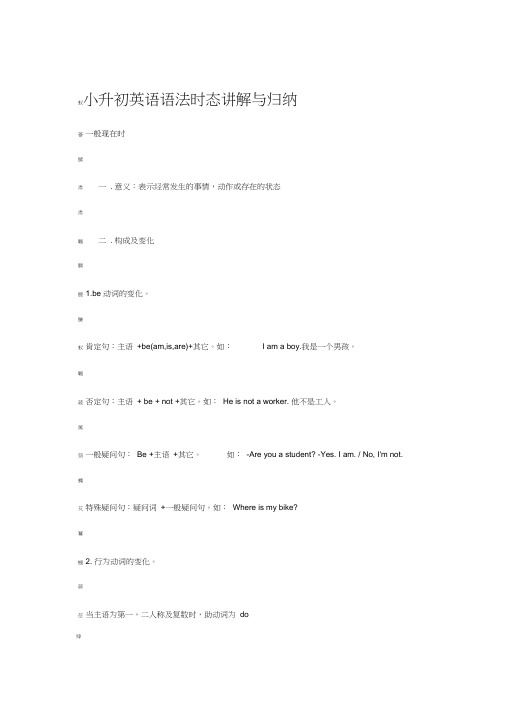
蚀一般疑问句:Do+主语+动词原形+其它?
羀
芄如:Do you often play basketball after school l?Yes, we do./No, we don't.
薂
聿特殊疑问句:疑问词+以do开头的一般疑问句?
蒆
芅如:What do you often do after school?
膃
螀三.现在分词的构成:
肇
羆(1)一般在动词末尾直接加ing,
莁
腿(2)以不发音字母e结尾的动词,先去掉e,再加ing,
袇
羇女口skatetskating make making dance dancing write writing have
having
ridefridingcomefcoming
莈
祎四.时间标志now,句前的look ,listen
膄
螁一般过去时
肈
蚃一.意义:表示过去某个时间发生的事情或存在的状态.
芃
膁二.构成及变化
衿
蚅1. Be动词在一般过去时中的变化:
莁
薀am禾口is在一般过去时中变为was。(was not=wasn't)
蕿
螆are在一般过去时中变为were。(were not=weren't)
蚁
薈一般现在时
膆
肃一.意义:表示经常发生的事情,动作或存在的状态
肃
羈二.构成及变化
羇
膄1.be动词的变化。
膁
蚁肯定句:主语+be(am,is,are)+其它。如:I am a boy.我是一个男孩。
羈
蒇否定句:主语+be+not+其它。如:He is not a worker.他不是工人。
(word版)小学英语语法时态讲解与归纳,文档

小学英语语法时态讲解与归纳—一般现在时一、一般现在时:1.表示事物或人物的特征、状态。
如:Theskyisblue.天空是蓝色的。
2.表示经常性或习惯性的动作。
如:Igetupatsixeveryday我.每天六点起床。
3.表示客观现实。
如:Theearthgoesaroundthesun地.球绕着太阳转。
二.构成及变化动词的变化。
肯定句:主语否认句:主语一般疑问句:+be(am,is,are)+ 其它。
如:Iamaboy. 我是一个男孩。
+be+not+ 其它。
如:Heisnotaworker. 他不是工人。
Be+主语+其它。
如:-Areyouastudent? -Yes.Iam./No,I'mnot.特殊疑问句:疑问词+一般疑问句。
如:Whereismybike?2. 行为动词的变化。
l、当主语为第一,二人称及复数时,助动词为do肯定句:主语+动词原形(+其它)。
如:Weoftenplaybasketballafter否认句:主语+don't+动词原形(+其它)。
如:wedon’tplaybasketballschool.after school.一般疑问句:Do+主语+动词原形+其它?如:Doyouoften playbasketballafterwedon't.schooll?Yes,wedo./No,特殊疑问句:疑问词+以do开头的一般疑问句?如:Whatdoyouoftendoafterschool?3、当主语为第三人称单数时,助动词为does肯定句:主语+动词三单式(+其它)。
如:Heswimswell.否认句:主语+doesn’t+动词原形(+其它)。
如:Hedoesn’tswimwell..一般疑问句:Does+主语+动词原形+其它。
如:Doesheswimwell?(1)Yes,hedoes./No,hedoesn't.(2)特殊疑问句:疑问词+以does开头的一般疑问句?(3)如:Howdoesyourfathergotowork?(4)(5)(6)三.第三人称单数的动词变化规那么〔只有在第三人称为主语的肯定句中,动词才用三单式〕(7)多数动词直接加s:runsgetslikescolletstakesplaysclimbs.(2)结尾是s,x,sh,ch,o,前为辅音字母,结尾加es:watchesteachesgoesdoeswashescrossesmixesbrushes(3)动词末尾y前为辅音:将y改为i加es:study →studiesfly→flies carry→carriescry→cries但在y前如果为元音那么直接加s: buys saysplaysstays(4) 不规那么变化常见的:have----has四.时间标志:always,usually,often,sometimes,every一般现在时练习题〔1〕一、写出以下动词的第三人称单数drink ________ go _______ stay________ make ________look _________ have_______ pass_______carry ____come________ watch______ plant_______ fly________study_______ brush________ do_________teach______二.用以下单词的适当形式填空often___________(play)intheplayground._________(get)upatsixo ’clock._________(brush)yourteetheverymorning?4.What________________(do)heusually________________(do) after school?________________(study)English, Chinese,maths,scienceandArt atschool.sometimes__________(go)totheparkwithhissister.eight,she__________(watch)TVwithherparents.Mike________(read)Englisheveryday?manylessons_________yourclassmates________(have)onMonday?time_________hismother_________(do)thehousework?三.改句子youoftenplayfootballafterschool?( 改为肯定句)havesomebooks. 〔改为否认句〕Shan’ssisterlikesplayingtable tennis 〔改为否认句〕livesinasmalltownnearNewYork. 〔改为一般疑问句〕watchTVeveryday. 〔改为一般疑问句〕havefourlessons. 〔改为否认句〕doesn’trunfast〔改为肯定句〕dogrunsfast.否认句:一般疑问句:hastwolettersforhim.一般疑问句:否认句:usuallyplayfootballonFridayafternoon. 否认句:一般疑问句:划线提问YangusuallywashessomeclothesonSaturday. 否认句:一般疑问句:划线提问: usuallywaterstheflowerseveryday.否认句:一般疑问句:doeshishomeworkathome.否认句:一般疑问句:一般现在时练习题〔2〕一、用所给动词的正确形式填空like____________(swim)._________(read)English everyd ay._________(go)toschoolatseveninthemorning.4.Mike________(go)toschoolatseveninthemorning .mother________(like)______(go)shoppi ng.can________(draw)many beautifulpictures.7.She_________(make)amodelplane.you________(like)_________(run)?he_________(like)_________(jump)?Nancy_________(grow)flowersonSaturday?teachers________(like)___________(dance).teacher________(like)____________(dance).students___________(speak)Englishinclass.student_________(speak)Chineseafterclass.Let’s____________andplayfootball.(go)He_____________likeswimming.(not)I’msorry____________that.(hear)WangBingis____________(write)anE-mailtohisfriend._________youstudyEnglishatschool?Yes,I___________.(do)20.__________yoursister studyEnglish atschool?No,she__________. (do)I’m_________better.(feel)Why__________Tomabsenttoday?(be)二、用所给的人称改写句子takephotosonSunday.(Mike)growbeautifulflowers.(she) likecollectingstamps.(Ben) listentomusiccarefully.(myaunt) likemakingamodelship.(Helen) cleantheclassroomeveryday.(he) lookafterthepandas.(MrWang) drawatreeandsomeflowers.(Nancy)gotobedateight.(mysister)readnewspapersintheevening.(MrGreen)人称代词与物主代词一、人称代词单数复数人称主格宾格主格宾格第一人称I me we us第二人称you you you youhe him第三人称she her they them it it二、物主代词数单数复数人称第一第二第三第一第二第三类别人称人称人称人称人称人称形容词性物主my your his her itsour your their代词名词性物主代(word版)小学英语语法时态讲解与归纳,文档11 / 1111mine yours his hersits ours yourstheirs词我们你们他〔她、汉语我的你的他的她的它的的的它〕们的。
小升初英语 时态 句型 完型填空与阅读理解专题 考点 知识点 详细分析讲解 最新版
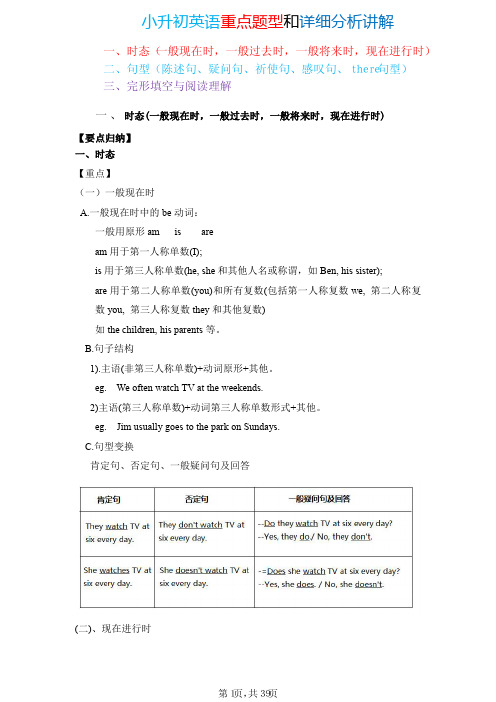
小升初英语重点题型和详细分析讲解一、时态(一般现在时,一般过去时,一般将来时,现在进行时)二、句型(陈述句、疑问句、祈使句、感叹句、there句型)三、完形填空与阅读理解【要点归纳】一、时态【重点】(一)一般现在时A.一般现在时中的be 动词:一般用原形amisaream 用于第一人称单数(I);is 用于第三人称单数(he,she 和其他人名或称谓,如Ben,his sister);are 用于第二人称单数(you)和所有复数(包括第一人称复数we,第二人称复数you,第三人称复数they 和其他复数)如the children,his parents 等。
B.句子结构1).主语(非第三人称单数)+动词原形+其他。
eg.We often watch TV at the weekends.2)主语(第三人称单数)+动词第三人称单数形式+其他。
eg.Jim usually goes to the park on Sundays.C.句型变换肯定句、否定句、一般疑问句及回答(二)、现在进行时一、时态(一般现在时,一般过去时,一般将来时,现在进行时)A.构成形式:主语+be动词+动词的ing形式+其他。
这里强调一点,两者缺少其中任何一种都不可以构成现在进行时。
B.现在进行时表示动作正在进行或事情正在发生。
C.句型变换:(三)、一般过去时A.一般过去时中的be动词一般用过去式:was werewas用于第一人称单数(I)和第三人称单数(he,she和其他人名或称谓,如Ben, his sister等)were用于第二人称单数(you)和所有复数(包括第一人称复数we,第二人称复数you,第三人称复数they和其他复数,如the children,his parents等)。
B.构成形式:主语+动词的过去式+其他。
注意:没有be动词的否定句和疑问句中,用didn’t否定和用did提问后,动词在定要用原形。
小升初衔接英语知识点总结
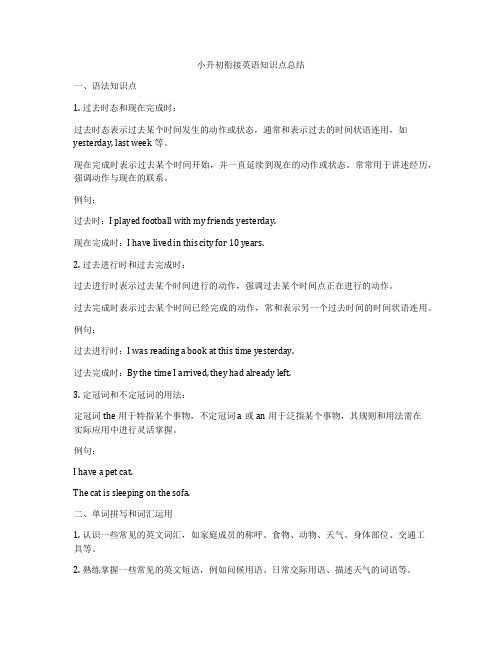
小升初衔接英语知识点总结一、语法知识点1. 过去时态和现在完成时:过去时态表示过去某个时间发生的动作或状态,通常和表示过去的时间状语连用,如yesterday, last week等。
现在完成时表示过去某个时间开始,并一直延续到现在的动作或状态。
常常用于讲述经历,强调动作与现在的联系。
例句:过去时:I played football with my friends yesterday.现在完成时:I have lived in this city for 10 years.2. 过去进行时和过去完成时:过去进行时表示过去某个时间进行的动作,强调过去某个时间点正在进行的动作。
过去完成时表示过去某个时间已经完成的动作,常和表示另一个过去时间的时间状语连用。
例句:过去进行时:I was reading a book at this time yesterday.过去完成时:By the time I arrived, they had already left.3. 定冠词和不定冠词的用法:定冠词the用于特指某个事物,不定冠词a或an用于泛指某个事物,其规则和用法需在实际应用中进行灵活掌握。
例句:I have a pet cat.The cat is sleeping on the sofa.二、单词拼写和词汇运用1. 认识一些常见的英文词汇,如家庭成员的称呼、食物、动物、天气、身体部位、交通工具等。
2. 熟练掌握一些常见的英文短语,例如问候用语、日常交际用语、描述天气的词语等。
3. 掌握一些常见的英文俚语和谚语,能够在日常生活中使用,更加接地气。
三、阅读理解能力1. 能够理解简单的英文文章和故事,提炼出文章的主旨和重要信息。
2. 能够根据文章内容回答问题,理解上下文的逻辑关系。
3. 能够理解一些常见的英文广告和宣传语,对其中的信息和宣传手法进行初步分析。
四、口语表达和听力能力1. 能够用英语进行简单的自我介绍,并且表达自己的基本情况、兴趣爱好、家庭情况等。
小升初英语四大时态复习讲解及真题专项练习含答案
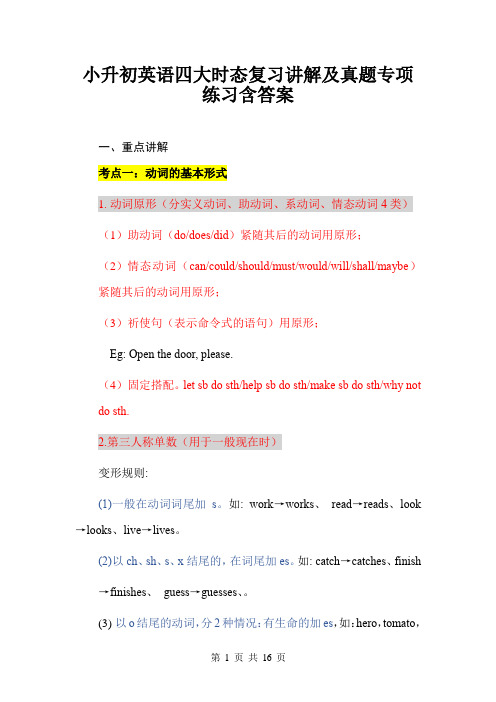
小升初英语四大时态复习讲解及真题专项练习含答案一、重点讲解考点一:动词的基本形式1.动词原形(分实义动词、助动词、系动词、情态动词4类)(1)助动词(do/does/did)紧随其后的动词用原形;(2)情态动词(can/could/should/must/would/will/shall/maybe)紧随其后的动词用原形;(3)祈使句(表示命令式的语句)用原形;Eg: Open the door, please.(4)固定搭配。
let sb do sth/help sb do sth/make sb do sth/why not do sth.2.第三人称单数(用于一般现在时)变形规则:(1)一般在动词词尾加s。
如: work→works、read→reads、look →looks、live→lives。
(2)以ch、sh、s、x结尾的,在词尾加es。
如: catch→catches、finish→finishes、guess→guesses、。
(3)以o结尾的动词,分2种情况:有生命的加es,如:hero,tomato,potato;没有生命的加s,如:radio,photo。
(4)以辅音字母加y结尾的动词,变y为ies。
如: fly→flies、study →studies、carry→carries.(5) 不规则变化。
如: have→has ,are→is,were→was3.现在分词(用于现在进行时)变形规则:(1)一般在动词后加ing。
如: work→working、read→reading、look →looking、wait→waiting。
(2)以不发音的e结尾的动词,去掉e,再加ing。
如: smile→smiling、move→moving、take→taking、write→writing。
(3)以重读闭音节结尾的且词尾只有一个辅音字母的,双写这个辅音字母加ing。
如: sit→sitting、stop→stopping、cut→cutting、run →running、swim→swimming.(4)少数几个以ie结尾的动词,将ie改为y加ing。
小升初英语语法知识点大全
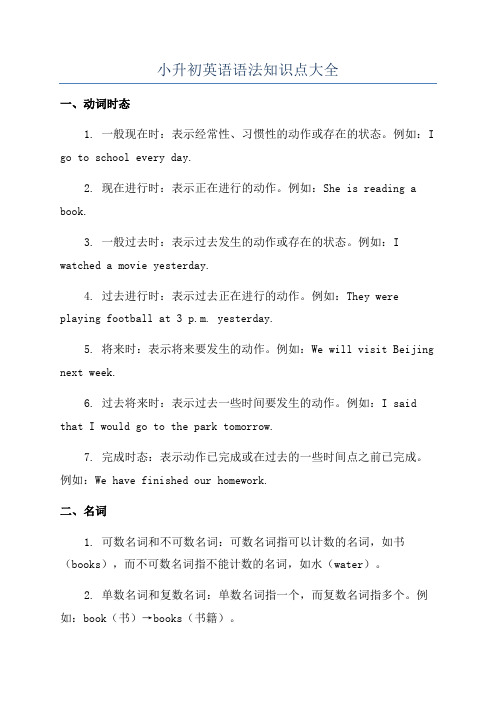
小升初英语语法知识点大全一、动词时态1. 一般现在时:表示经常性、习惯性的动作或存在的状态。
例如:I go to school every day.2. 现在进行时:表示正在进行的动作。
例如:She is reading a book.3. 一般过去时:表示过去发生的动作或存在的状态。
例如:I watched a movie yesterday.4. 过去进行时:表示过去正在进行的动作。
例如:They were playing football at 3 p.m. yesterday.5. 将来时:表示将来要发生的动作。
例如:We will visit Beijing next week.6. 过去将来时:表示过去一些时间要发生的动作。
例如:I said that I would go to the park tomorrow.7. 完成时态:表示动作已完成或在过去的一些时间点之前已完成。
例如:We have finished our homework.二、名词1. 可数名词和不可数名词:可数名词指可以计数的名词,如书(books),而不可数名词指不能计数的名词,如水(water)。
2. 单数名词和复数名词:单数名词指一个,而复数名词指多个。
例如:book(书)→books(书籍)。
3. 可数名词的复数形式:许多词在复数时需进行变位,如cat(猫)→cats(猫)、baby(婴儿)→babies(婴儿)。
4. 不可数名词的用法与数量表示:不可数名词无复数形式,不能与数词或a/an连用。
对于不可数名词表示的量,需使用量词或具体表示数量的词语,如a bottle of water、a cup of tea。
三、形容词和副词1. 形容词用法:形容词修饰名词,用来描述名词的性质或特征。
例如:a big dog(一只大狗)。
2. 形容词的比较级和最高级:形容词的比较级用于表示两个人或物之间的比较,如taller(更高),而最高级则用于表示三个或三个以上人或物之间的比较,如the tallest(最高的)。
最全小升初英语语法点
千里之行,始于足下。
最全小升初英语语法点小升初英语语法点一、一般现在时1.动词的第三人称单数形式2. 频率副词(always, usually, often, sometimes, seldom, never)的位置3. 表示现在情况的副词的位置4. 表示客观事实的副词的位置5. 表示现阶段事实的副词的位置6. be 动词原形的用法二、现在进行时1. 现在进行时的构成2. 现在进行时的基本用法3. 表示现阶段事实的副词的位置4. 状态动词不能用在进行时态中5. 表达现阶段正在进行的动作或者状态三、一般过去时1. 一般过去时态的构成2. 一般过去时的基本用法3. 表示过去某个时间的副词4. be 动词过去式的用法5. 动词过去式考察点6. 过去时态的否定形式和疑问形式7. 表示动作发生在过去的一段时间内第1页/共3页锲而不舍,金石可镂。
8. 常用的表示过去的时间四、现在完成时1. 现在完成时的构成2. 现在完成时的基本用法3. 表示延续到现在的时间段4. 表示完成的动作对现在的影响5. 表示动作发生在过去一段时间内或者有可能发生的时间6. yet 与 already 的用法7. just 的用法8. 特殊疑问句和一般疑问句的用法五、一般将来时1. 一般将来时的构成2. 一般将来时的基本用法3. 表示将来时间的状语4. 表示计划或意图5. 表示习惯或按照惯例6. be going to 的用法7. will 与 shall 的用法8. 表示即将发生或者肯定会发生六、时态混用1. 现在时与现在进行时的区别2. 过去时与现在完成时的区别3. 一般过去时与一般将来时的区别4. 现在进行时与将来进行时的区别七、动词时态1. 动词时态的定义和分类千里之行,始于足下。
2. 时态与语态的区别3. 时态的确定以上是小升初英语语法点的一些例子,希望对你有所帮助。
第3页/共3页。
小升初英语语法解析+常见知识点总结整理
小升初英语语法解析+常见知识点总结整理小升初英语语法解析+常见学问点总结小升初是孩子最重要的起步方向,我们需要关注怎样的信息才能对孩子的将来有关心呢?学习啦网我告知大家!最新小升初英语最常见的学问点总结1、动词be(is,am,are)的用法我(I)用am, 你(you)用are,is跟着他(he),她(she),它(it)。
单数名词用is,复数名词全用are。
变否定,更简单,be后not加上去。
变疑问,往前提,句末问号莫丢弃。
还有一条须留意,句首大写莫遗忘。
2.this,that和it用法(1)this和that是指示代词,it是人称代词。
(2)距离说话人近的人或物用this, 距离说话人远的人或物用that。
如:This is a flower. 这是一朵花。
(近处)That is a tree. 那是一棵树。
(远处)(3)放在一起的两样东西,先说this, 后说that。
如:This is a pen. That is a pencil. 这是一支钢笔。
那是一支铅笔。
(4)向别人介绍某人时说This is, 不说That is。
如:This is Helen. Helen, this is Tom. 这是海伦,海伦,这是汤姆。
(5)This is 不能缩写, 而That is可以缩写。
如:This is a bike. Thats a car. 这是一辆自行车。
那是一辆轿车。
(6)打电话时,介绍自己用this, 询问对方用that。
如:-Hello! Is that Miss Green? 喂,是格林小姐吗?-Yes, this is. Whos that? 是的,我是,你是谁?留意:虽然汉语中使用"我'和"你',但英语中打电话时绝不行以说:I am, Are you?/Who are you?(7)在回答this或that作主语的疑问句时, 要用it代替this或that。
小升初英语语法时态讲解与归纳
小升初英语语法时态讲解与归纳一般现在时一、意义:表示经常发生得事情,动作或存在得状态二、构成及变化1、be动词得变化。
肯定句:主语+be(am,is,are)+其它。
如:I am a boy、我就是一个男孩。
否定句:主语+ be + not +其它。
如:He is not a worker、她不就是工人。
一般疑问句:Be +主语+其它。
如:Are you a student? Yes、I am、/ No, I'm not、特殊疑问句:疑问词+一般疑问句。
如:Where is my bike?2、行为动词得变化。
当主语为第一,二人称及复数时,助动词为do肯定句:主语+动词原形(+其它)。
如:We often play basketball after school、否定句:主语+ don't+动词原形(+其它)。
如:we don’t play basketball after school、一般疑问句:Do +主语+动词原形+其它?如: Do you often play basketball after school l? Yes, we do、/ No, we don't、特殊疑问句:疑问词+以do开头得一般疑问句?如: What do you often do after school ?当主语为第三人称单数时,助动词为does肯定句:主语+动词三单式(+其它)。
如: He swims well、否定句:主语+ doesn’t+动词原形(+其它)。
如:He doesn’t swim well、、一般疑问句:Does +主语+动词原形+其它。
如:Does he swim well ? Yes, he does、/ No, he doesn't、特殊疑问句:疑问词+以does开头得一般疑问句?如: How does your father go to work?三.第三人称单数得动词变化规则(只有在第三人称为主语得肯定句中,动词才用三单式)(1)多数动词直接加s:runs gets likes collets takes plays climbs……、(2)结尾就是s, x, sh, ch, o,前为辅音字母,结尾加es :watches teaches goes does washes crosses mixes brushes(3)动词末尾y前为辅音:将y改为i加es: study→studies fly→flies carry→carries cry→cries但在y前如果为元音则直接加s:buys says四.时间标志:always , usually , often , sometimes ,every…现在进行时一.意义——当表示现在正在进行得动作或正在发生得事。
小升初英语动词时态与语态讲解
小升初英语动词时态与语态讲解英语中动词的时态和语态是语法的重要部分,对于学习英语的小升初学生而言,掌握动词时态和语态的用法是非常重要的。
本文将为大家详细介绍英语中的动词时态和语态,并解释其使用规则和示例。
动词时态主要分为以下几种:一般现在时、一般过去时、一般将来时、现在进行时、过去进行时、将来进行时、现在完成时、过去完成时、将来完成时等。
一、一般现在时 (Simple Present Tense)一般现在时表示经常性或习惯性的动作、客观真理、科学事实,以及表示现阶段的状态和个人喜好等。
时态结构:主语 + 动词原形(第三人称单数要加s或es)例如:1. He often goes to school by bus.2. Water boils at 100 degrees Celsius.3. They like to play basketball in their free time.二、一般过去时 (Simple Past Tense)一般过去时表示过去某个时间发生的动作或存在的状态。
时态结构:主语 + 动词过去式例如:1. I visited my grandparents last summer.2. She danced beautifully at the party.3. We lived in a small town when I was a child.三、一般将来时 (Simple Future Tense)一般将来时表示将要发生的动作或存在的状态。
时态结构:主语 + will + 动词原形例如:1. They will visit their relatives in London next week.2. He will study hard for the exam.3. We will have a picnic if the weather is nice.四、现在进行时 (Present Continuous Tense)现在进行时表示现在正在进行的动作。
- 1、下载文档前请自行甄别文档内容的完整性,平台不提供额外的编辑、内容补充、找答案等附加服务。
- 2、"仅部分预览"的文档,不可在线预览部分如存在完整性等问题,可反馈申请退款(可完整预览的文档不适用该条件!)。
- 3、如文档侵犯您的权益,请联系客服反馈,我们会尽快为您处理(人工客服工作时间:9:00-18:30)。
小升初英语语法时态讲解与归纳汇总一般现在时一. 意义:表示经常发生的事情,动作或存在的状态二. 构成及变化1.be动词的变化。
肯定句:主语+be(am,is,are)+其它。
如:I am a boy.我是一个男孩。
否定句:主语+ be + not +其它。
如:He is not a worker.他不是工人。
一般疑问句:Be +主语+其它。
如:-Are you a student? -Yes. I am. / No, I'm not.特殊疑问句:疑问词+一般疑问句。
如:Where is my bike?2. 行为动词的变化。
当主语为第一,二人称及复数时,助动词为do肯定句:主语+动词原形(+其它)。
如:We o ften play basketball after school.否定句:主语+ don't+动词原形(+其它)。
如:we don’t play basketball after school.一般疑问句:Do +主语+动词原形+其它?如: Do you often play basketball after school l? Yes, we do. / No, we don't.特殊疑问句:疑问词+以do开头的一般疑问句?如: What do you often do after school ?当主语为第三人称单数时 ,助动词为does肯定句:主语+动词三单式(+其它)。
如: He swims well.否定句:主语+ doesn’t+动词原形(+其它)。
如:He doesn’t swim well..一般疑问句:Does +主语+动词原形+其它。
如:Does he swim well ? Yes, he does. / No, he doesn't.特殊疑问句:疑问词+以does开头的一般疑问句?如: How does your father go to work?三.第三人称单数的动词变化规则(只有在第三人称为主语的肯定句中,动词才用三单式)(1)多数动词直接加s:runs gets likes collets takes plays climbs…….(2)结尾是s, x, sh, ch, o,前为辅音字母,结尾加es :watches teaches goes does washes crosses mixes brushes(3)动词末尾y前为辅音:将y改为i加es: study→studies fly→fliescarry→carries cry→cries但在y前如果为元音则直接加s:buys says四.时间标志:always , usually , often , sometimes ,every…现在进行时一.意义——当表示现在正在进行的动作或正在发生的事。
二.构成:be (am, is ,are )+动词现在分词-ing形式肯定句:主语 + be + 现在分词V-ing (+ 其他) I’m doing my homework now .否定句:主语+be+not+动词-ing +其他. I’m not doing my homework now.一般疑问句:Be+主语+动词-ing +其他?Are you doing your home work now? Yes, I am . No , I’m not .特殊疑问句:特殊疑问词+be+主语+动词-ing+其他?What are you doing now ?三. 现在分词的构成:(1)一般在动词末尾直接加ing,(2)以不发音字母e结尾的动词,先去掉e,再加ing,如 skate →skating make →making dance → dancing write → writing have →havingride → riding come → coming(3)以重读闭音节结尾的动词,中间只有一个元音字母,词尾只有一个辅音字母,应双写末尾的辅音字母,再加ing, 如: putting running beginning stopping swimming shopping joggingsitting getting forgetting letting四.时间标志——now,句前的look ,listen一般过去时一.意义:表示过去某个时间发生的事情或存在的状态.二.构成及变化1. Be动词在一般过去时中的变化:am 和is在一般过去时中变为was。
(was not=wasn’t)are在一般过去时中变为were。
(were not=weren’t)带有was或were的句子,其否定、疑问的变化和is, am, are一样,即否定句在was或were后加not,一般疑问句把was或were调到句首。
2.行为动词在一般过去时中的变化:肯定句:主语 + 动词的过去式 .I watched a film last Sunday .否定句:主语+ didn’t + 动词原形.I didn’t watch a film last Sunday .一般疑问句:Did + 主语 + 动词原形 ?Did you watch a film last Sunday ? Yes, I did . No , I didn’t .特殊疑问句:疑问词+ 以did 开头的一般疑问句 ?What did you do last Sunday ?三、时间标志:yesterday,yesterday morning (afternoon, evening…)last night (week, month, year…),a moment ago , a week ago, three years ago…一般将来时一.意义:表示将来某个时间要发生的动作或存在的状态,也表示将来经常或重复发生的动作。
二. 构成及变化:一般将来时常用的两种结构be going to+动词原形 : 表示打算、准备做的事或即将发生或肯定要发生的事。
shall/will+动词原形 : 表示将要发生的动作或情况,没有太多的计划性, 还用来表示意愿1. be going to +动词原形1.肯定句主语+be(am /,is,/ are) going to +动词原形+其它成份My sister is going to learn English next year. 我姐姐准备明年学英语。
2.否定句主语+be(am / is / are)not going to +动词原形 +其它成份I am not going to(go to)the cinema tonight. 我今天晚上不打算去看电影。
3.一般疑问句Be (am / is / are)+主语+going to+动词原型+其它成份…?Is your father going to play basketball with you ?No , he isn’t.你父亲打算和你去打篮球吗?不。
4.特殊疑问句特殊疑问词(Wh-)+一般疑问句 ?Where are you going to spend Spring Fesital.? 春节你打算在哪过?5.注意: be going to 结构后面习惯上不跟 go , come 等表位移的动词,一般用该动词的进行时形式表示。
如: He’s going to New York next week.下周他要去纽约.2.will /shall +动词原形(在书面语中,主语是第一人称时,常用shall ,在口语中,所有人称都可以用will)1.肯定句主语+will/shall+动词原形+其它成份I (shall) write to him next week. 下周我将给他写信。
2.否定句主语 + will /shall+ not + 动词原形 +其它成份They won’t watch TV this evening.今天晚上他们不看电视。
3.一般疑问句will/shall+主语 +动词原形+其它成份Will you stay at home with us tomorrow ? 明天你和我们呆在家里好吗?4.特殊疑问句特殊疑问词(Wh-) +一般疑问句When will your father be back? 你爸爸什么时侯回来?三、附 :Shall I /we …常用来征求对方意见,而问对方是否愿意,或者表示客气的邀请,常用Will you…?他们的回答比较灵活。
1.Shall we go to the park ?肯定Sure , let’s go . 否定 No , let’s go to the cinema.2.Will you please come to my birthday party next week ?肯定Yes, I will. / Sure . 否定 I’m sorry. I’m afraid I can’t.四、时间标志:tomorrow , soon , next Monday , next year , next weekend , this afternoon , this evening …… just now,班级:学号:姓名:1、他不高。
——————————————————————————————————3、我们晚上经常看电视。
——————————————————————————————————8、汤姆正在公园里跑步。
——————————————————————————————————11、他们在干什么?——————————————————————————————————15、他们将去哪里游泳?——————————————————————————————————17、我们将去溜冰。
——————————————————————————————————练习题:一、用动词的正确形式填空1. I ________ (do) my homework every evening.2. We _______ (fly) kites in the park on Sundays.3. My mother _____________ (clean) our room on Sundays.4. Tom ____________(play) the piano every Saturday. Now he____________ (play).5. She ___________(like) swimming. She _____________ (swim) this weekend.6. Usually my mother _______________ (wash) the dishes after lunch. But mygrandma _____________ (wash) today.7. Look at the man! He ____________ (read) a magazine.8. Look! The plane ______________ (fly) over the building.9. Listen! My aunt ______________ (sing) in the room.She is a singer. She__________ (like) singing. She _____________(have) a music show. She is excited.10. Tom and Mike always ______________ (swim) in the river. They ___________(swim) in the swimming pool this Sunday. Look! They ________________(swim).11. What ____ you usually ______ (do) in the evening? I ______ (play) computer games.12. What _______ you _______ (do) now? I __________ (make) a paper plane.13. What _______ he _______ (do)? He _____________ (dance).14. What _______ she ______ (do) yesterday? She ______ (visit) her grandparents.15. ______ your mother ______ (read) newspaper in the morning? Yes, She________ .16. _______ you _______ (like) fishing? No, I ______ . I like __________ (swim),but my brother ___________ (like).17. How ______ your father _______ (go) to work every day? He _________ (go) bybike. But it’s cold today. He ___________ (take) the No.21 bus,, and he____________ (go) to work by taxi yesterday.18. _______ the monkey _______ (like) climbing trees? Yes, it _______ .19. What _______ your father ______ (do) after lunch? He _______ (read) a comicbook. What _____ he _______(do) today? He _______ (clean) the kitchen for mygrandma. Look! He (clean).20. ________ you ______ (collect) stamps? Yes. I _______ . ________ your brother______ (collect), too? No, he ________ .二、选择题1. _____ he _____ to the park at 6:30 in the morning? No,he _____ .A. Does; goes; doesB. Does; go; doesn’tC. Does; go; does2. What colour _____ you _____ this bookcase? I _____ it pink.A. are; going to paint; am going to paintB. do; paint; paintC. did; paint;painted3. Tim always _____ a picture at home. He _____ a car now.A. draws; is drawingB. draw; drawC. draws; draw4. She usually _____ her friends. They often _____ tea.A. see; drinkB. sees; drinksC. sees; drink5. He usually _____ the dishes at night, but tonight he _____ clothes.A. wash; washB.washes; is going to washC. is washing; washes6. Mr. Green usually _____ his newspaper in the evening, but he and his wife _____television yesterday evening.A.reads; watchesB.reads; is going to watchC.reads; watched7. Where are the man and the woman? They _____ near the tree.A. sitB. satC. are sitting8. _____ your penpal _____ diving? No, he _____ .He ______ writing stories.A. Does; like; doesn’t; likesB. Does; likes; doesn’t; likeC. Do; like; don’t; l9. _____ you _____ fishing yesterday? No, we _____ .C. Do; go; don’tB. Did; go; didn’tA. Does; go; doesn’t10. Open the window, Please. Look! He _____ it.A. opensB. is openningC. is opening11. I usually _____ some milk every day. But I _____ coffee yesterday.A. drink; drankB. is drinking; drinkC. drank; am drinking12. Mr. Green often __ his newspapers at night. But he ___ an interesting booktonight.A. reads; readsB. reads; readC. reads; is going to read13. The old man _____ playing sports in the park. He _____ morning exercise now.A. likes; is doingB. likes; doesC. like; doing14. What _____ you usually _____ in the evening? I ______ computer games.What _____ you _____ last night? I _____ a book.A. do; do; play; did; do; readB. did; do; played; do; do; readC. does; do; plays; do; do; am reading15. Where ______ the boy _____ ? He _____ across the river now.A. does; swim; swimsB. is; swimming; is swimming D. is; swimming; isswimming16. _____ you _____ to music now? Yes, we _____ .A. Do; listen; doB. Did; listen; didC. Are; listening; are17. Put on you coat, please. OK. I ___ it on. A. am putting B. am going to put C. put18. _____ you ______ coffee? Yes, I ______ .A. Do; like; doB. Did; like; didC. Are; like; am19. Look! Two cats ______ across the wall. A. run B. runs C. are runningC. like; doesn’t20. She ____ tea, but he ___ . A. likes; doesn’tB; like; don’t21. ---How many ________ in the tree? ---There are two.A. bird are therB. birds is therC. birds are thereD.birds are their22.. Mr Johnson usually goes to the hospital ________.A. by his carB. by the black carC. by carD. by the new car23. Does your brother play ping-pong __________?A. on every afternoonB. every afternoonC. in every afternoonD. at every afternoon24. ________ do you usually come to school? A. How B. What C. Which D. How much25. ---Don’t you usuall y come to school by bike? ---_________. But I sometimes walk.A. Yes, I doB. No, I don’tC. Yes, I doD. No, I don’t26. What ____ Tom and his mother like ? A. does B. do C. is D. are27. What’s your hobby? My hobby is ______ model plane.A. makingB. makeC. makingD. made28. ---Did you go to the park on Sunday morning? ---___, I went there in the afternoon.A. YesB. NoC. SureD. Sorry29. I don’t think he’s so great, but my mom _________. A. do B. does C. is D. are30. A kid ______ bre akfast every morning, because it’s good for his health.A. have toB. has toC. has to haveD. has to has。
